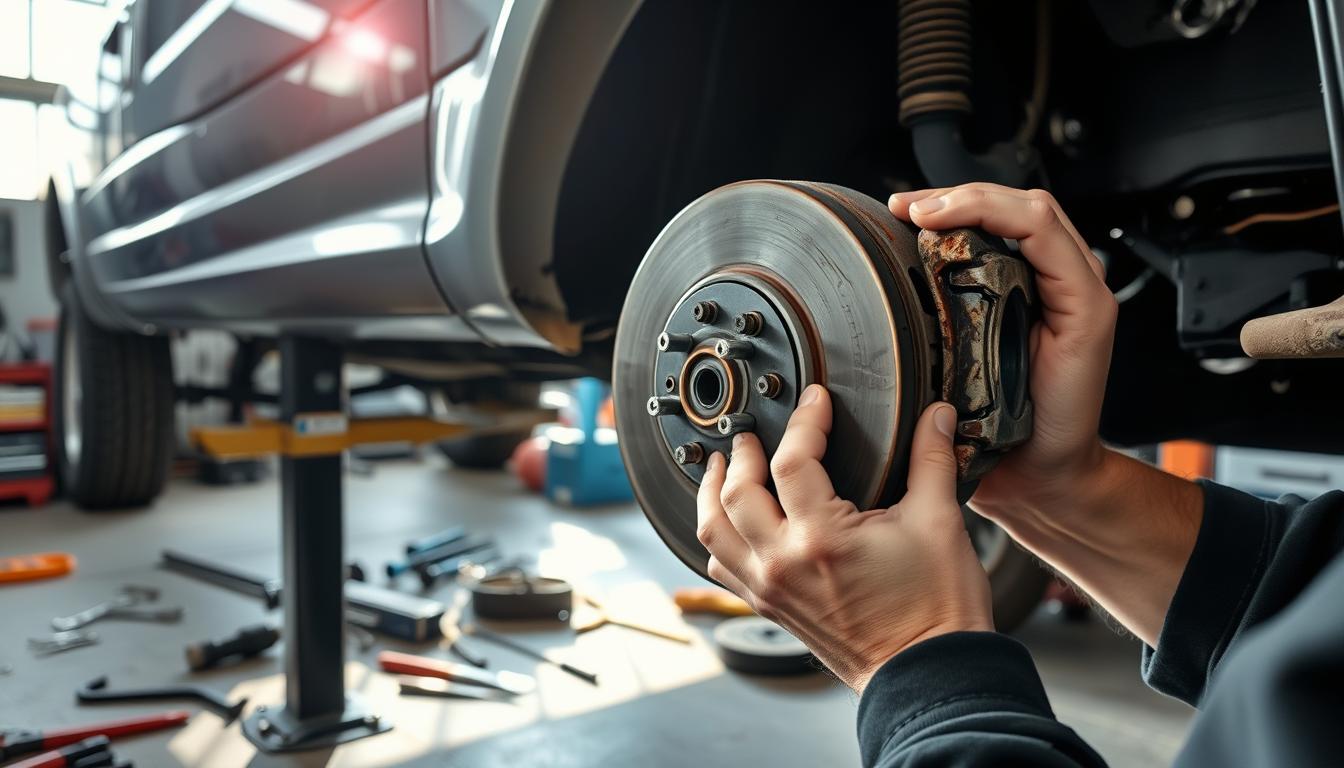Changing brake pads on your Dodge Ram 2500 is key for every owner. It boosts your truck’s braking and keeps you safe on the road. This guide will show you how to do it, perfect for DIY fans.
You’ll learn about tools and safety first. Then, we’ll cover the steps for replacing brake pads. This will keep your Dodge Ram running great.
Key Takeaways
- Regular brake pad replacement is vital for safety.
- Keeping your Dodge Ram 2500 in good shape improves braking.
- Quality tools and parts are essential for DIY success.
- Spotting worn brake pads can stop more damage.
- Regular checks and care extend your brake system’s life.
Introduction to Brake Pads and Their Importance
Brake pads are key to a vehicle’s brakes working well. They rub against the rotors to slow or stop the car. Knowing about brake pads is crucial, more so for heavy-duty vehicles like the Dodge Ram 2500.
There are many types of brake pads. They are made from materials like ceramic or metallic. Each type is designed for different driving needs.
Understanding Brake Pads
Brake pads come in two main types: organic and metallic. Organic pads are quieter and make less dust. Metallic pads work better in hot conditions.
For those who tow heavy loads, high-performance pads like Power Stop Z36 are a good choice. Brake pads wear out differently, depending on how you use your vehicle. Knowing about brake pads helps keep your brakes in top shape.
Signs of Worn Brake Pads
It’s important to know when brake pads need to be replaced. Look out for these signs:
- Squealing sounds when braking.
- Grinding noises that suggest the pads are worn through.
- Vibrations during braking.
Ignoring these signs can cause bigger problems. It might even mean you need a whole brake system overhaul. For example, the 2013 Ram 2500’s OEM pads lasted 115,000 miles. But, it’s important to check and replace them regularly, even more so if you tow or drive in certain conditions.
Tools and Materials Needed
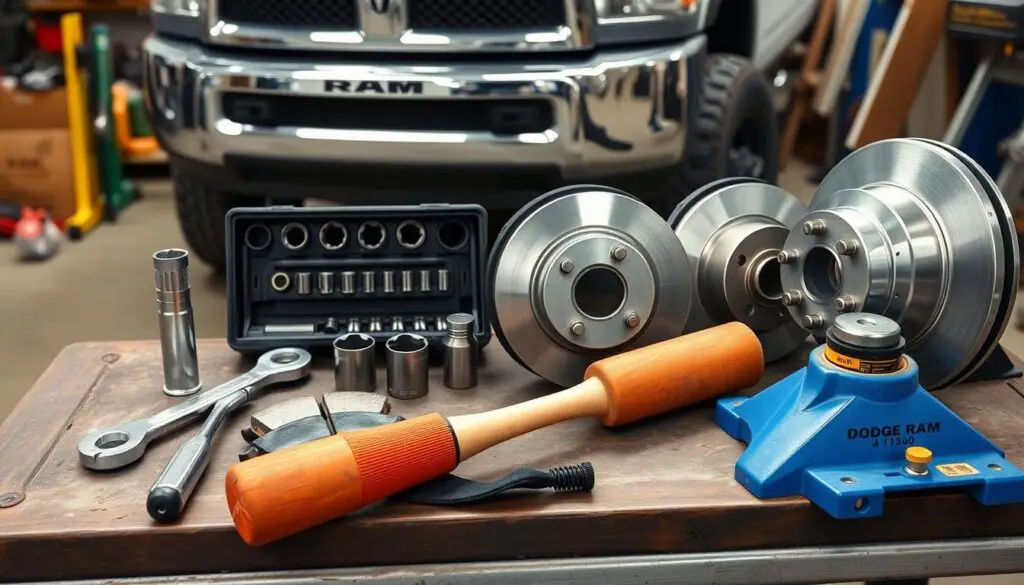
Before starting the brake pad replacement on your Dodge Ram 2500, get the right tools. This makes the job smoother and safer. You’ll also keep your brakes working well. Here are the key tools you need and some top brake pad brands for your Dodge Ram 2500.
Essential Tools for the Job
- Jack
- Socket set
- Torque wrench
- C-clamp
- Grease
These tools help you lift the vehicle safely, remove bolts, and install new brake pads. They make sure your new pads fit right. Using the right tools also protects your vehicle and makes your brakes better.
Recommended Brake Pad Brands
Choosing high-quality brake pads is key for safety and lasting performance. Here are some top brands:
| Brand | Key Features |
|---|---|
| Brembo | High performance, superior stopping power, reduced brake dust |
| Hawk | Durability, excellent friction performance, great for heavy-duty use |
| ACDelco | Dependable quality, engineered for smooth braking, value for money |
| Raybestos | Strong stopping performance, long-lasting wear, noise reduction technology |
These brands improve your Dodge Ram 2500’s braking. They make your driving safer and more efficient.
Safety Precautions Before Starting
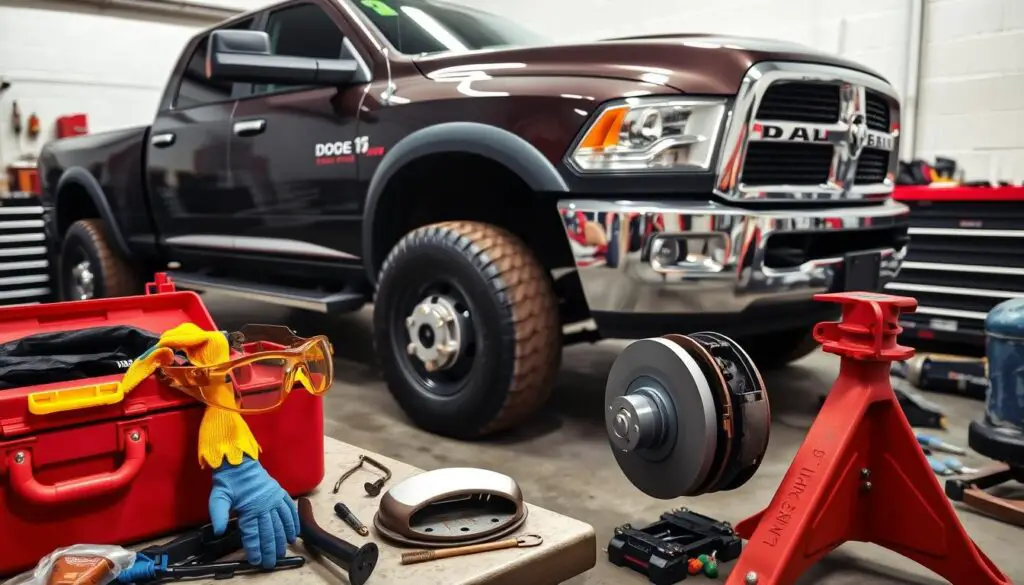
Before you start changing brake pads, it’s important to take safety steps. This makes the job easier and safer for everyone. Here are some key things to remember.
Personal Safety Gear
Wearing the right safety gear is crucial. Make sure you have:
- Safety goggles to protect your eyes from dust and debris.
- Gloves to keep your hands safe from sharp things and dirt.
- Long sleeves to cover your arms and avoid getting hurt.
Wearing this gear is the first step to a successful brake pad change.
Vehicle Safety Measures
Vehicle safety is just as important as personal safety. Here are some tips to keep you safe:
- Always park on a level surface to avoid rolling.
- Use the parking brake to keep the car from moving.
- Put the car on jack stands to keep it stable when it’s up.
- Chock the wheels to keep the car from moving while you work.
These steps help make your work area safer. Remembering each one is key to keeping you safe while working on your Dodge Ram 2500.
| Safety Gear | Purpose |
|---|---|
| Safety Goggles | Protects eyes from brake dust and debris |
| Gloves | Shields hands from sharp objects |
| Long Sleeves | Minimizes exposure to potential hazards |
| Jack Stands | Ensures stability for the raised vehicle |
| Wheel Chocks | Prevents vehicle movement during work |
Preparing Your Dodge Ram 2500
Getting ready for work on your Dodge Ram 2500 is key. Start by positioning the vehicle right and making sure it’s safe and easy to get to. These steps will help you replace the brake pads well.
Vehicle Positioning and Support
First, park your Dodge Ram 2500 on a flat, stable surface. This is important for safety while you work. Then, use a hydraulic jack to lift the truck.
When it’s high enough, put jack stands under the frame. This keeps the truck steady and safe while you work on the brakes.
Removing the Wheel
Now, the truck is ready, so you can remove the wheel. Start by loosening the lug nuts, following the torque settings for your Dodge Ram 2500. After loosening, lift the wheel off the hub carefully.
Be mindful of the wheel’s weight as you take it off. This will show you the brake assembly, ready for the next steps in changing the brake pads.
Steps to Change the Brake Pads
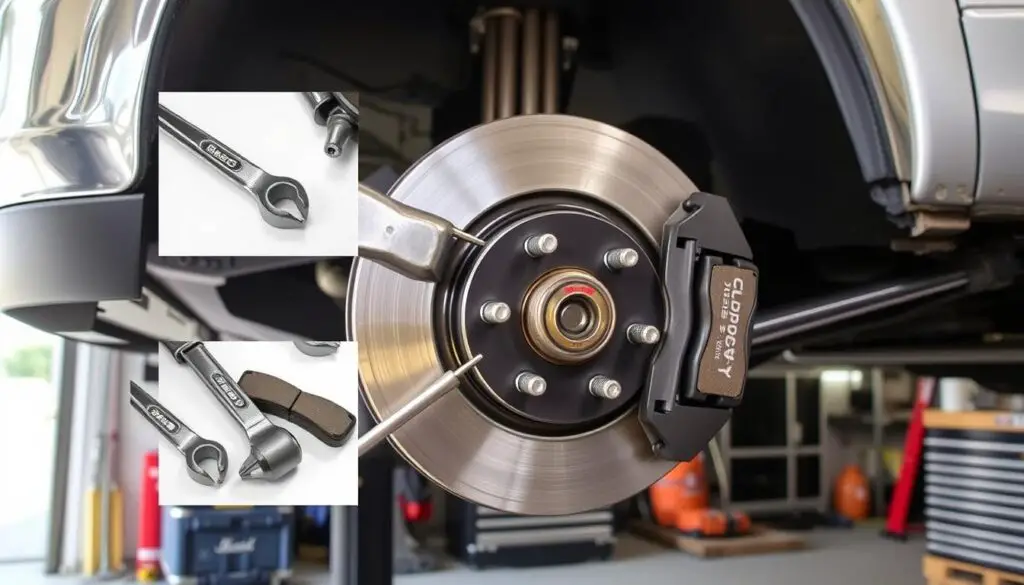
Changing brake pads on your Dodge Ram 2500 can make your brakes work better. Follow these steps to replace your brake pads. This will help your vehicle stay safe.
Removing the Old Brake Pads
First, get your tools ready. You’ll need a jack, jack stands, and a lug wrench. Lift the vehicle and use jack stands to keep it stable.
Take off the wheel and find the brake caliper. Use a socket wrench to remove the caliper bolts. Slide the caliper off the rotor to see the old brake pads.
Use a C-clamp to push the caliper piston back. This makes room for the new pads. Make sure everything is clean and in good shape. If the old pads are uneven, it might mean other brake problems.
Installing New Brake Pads
Now, it’s time to put in the new brake pads. Apply a bit of brake lubricant to the back of each pad. This stops squeaking.
Put the new pads in the caliper bracket, making sure they’re right with the rotor. Put the caliper back over the pads and bolt it in place. Tighten the bolts as the maker says to keep it safe.
After you’ve installed the new pads, check the brake fluid level. Press the brake pedal a few times to make sure the pads are working right. If you’re doing all four wheels, just do it all again.
Caliper and Rotor Inspection
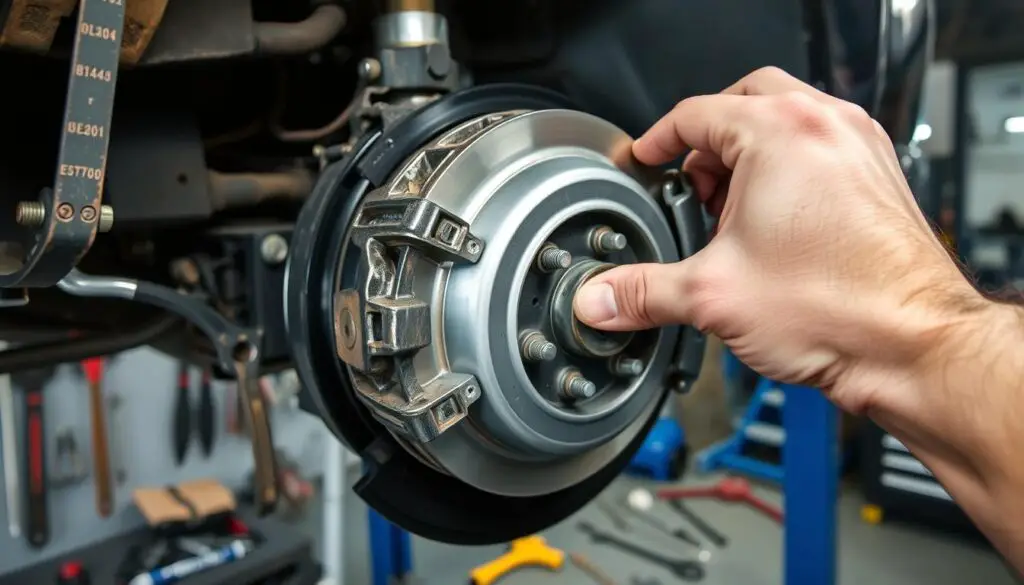
After you upgrade your brake pads, it’s important to check the caliper and clean the rotor. This makes sure your brakes work well and keeps you safe. Look for any damage and keep your brakes in top shape.
Checking for Damage
When you inspect the caliper, look for cracks, warping, or wear. Check the rotors too. Here are some things to look at:
- Inspect the rotor for scoring, pitting, and grooves.
- Check the caliper for fluid leaks.
- Measure the rotor thickness to see if it’s right.
Regular checks keep your brakes working right. Look for warped rotors, as they can hurt your stopping power.
Cleaning the Brake Components
Next, clean the rotors well to remove dirt. This helps them work better. Here’s how to clean them:
- Use brake cleaner on the rotor and caliper.
- Wipe them clean with a cloth.
- Make sure there’s no cleaner left before putting them back together.
Clean components help your brakes work better. They also make your brake pads and rotors last longer. This means safer driving.
| Brake Component | Recommended Actions | Frequency of Inspection |
|---|---|---|
| Calipers | Inspect for cracks and leaks | Every brake pad change |
| Rotors | Measure thickness, check for scoring | Every 10,000 miles |
| Brake Pads | Check remaining thickness | Every 10,000 miles |
By following these steps, your Dodge Ram 2500 will stay safe and reliable. It’s all about keeping your brakes in good shape.
Reassembling Your Dodge Ram 2500
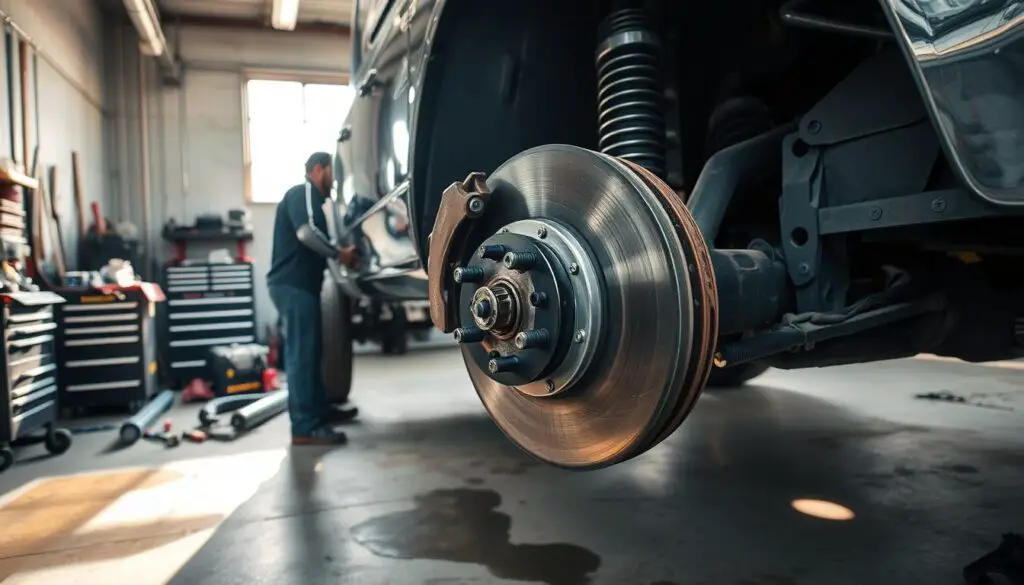
Putting your Dodge Ram 2500 back together right after brake pad and rotor changes is key. It makes sure everything fits well, and your vehicle is ready for the road. Here’s how to reinstall the wheel and lower the vehicle safely.
Reinstalling the Wheel
First, put the wheel back on the hub. Make sure the holes line up with the lug bolts. Then, use a lug wrench to tighten the lug nuts by hand. It’s important to tighten them, as the maker says, to avoid them coming loose while driving. A torque wrench helps get it just right:
- Check your owner’s manual for the right torque.
- Tighten in a crisscross pattern for evenness.
- Double-check everything before moving on.
Lowering the Vehicle Safely
Once the wheel is back on, it’s time to lower the vehicle safely from the jack stands. Start by taking out the jack stands and slowly lower the vehicle with the jack:
- Make sure nothing is under the vehicle.
- Slowly let the jack down, letting the vehicle settle.
- After it’s back on the ground, tighten the lug nuts one last time.
By following these steps, you’ll have your vehicle back together right. This means better performance and safety on the road.
Testing Your New Brake Pads
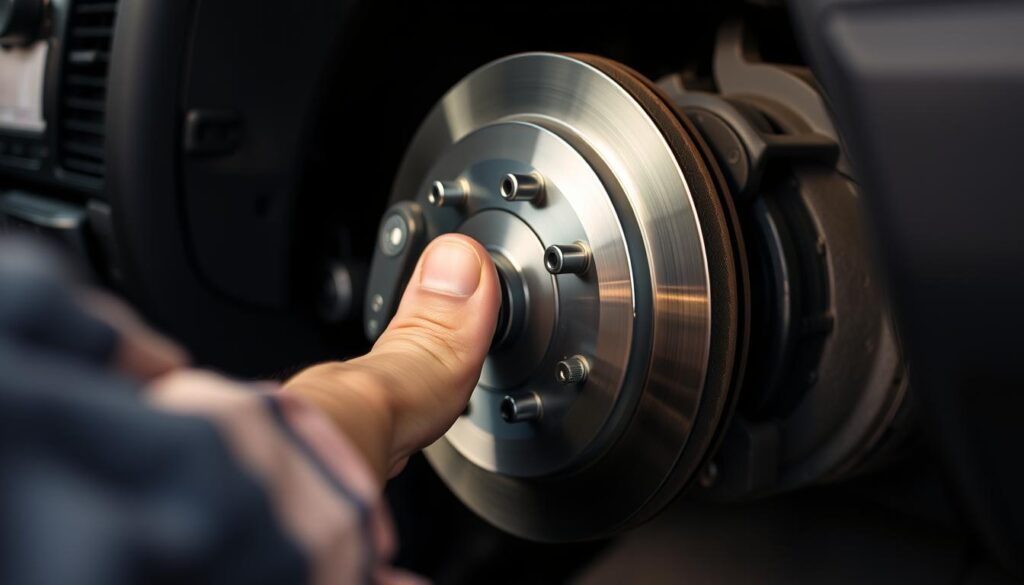
New brake pads need a good test to make sure they work right. This includes a bed-in process and watching for odd sounds while driving.
Initial Bed-In Process
The bed-in process is key after putting in new brake pads. It helps the pads fit well against the rotors, making braking better. Here’s what to do:
- Drive at a moderate speed to warm up the brakes.
- Make a few stops from about 30 mph to 10 mph.
- Let the brakes cool down between stops to avoid overheating.
These steps help the brake pads and rotors work together well. This makes braking better and lasts longer.
Listening to Unusual Sounds
When testing new brake pads, listen for odd sounds. Look out for grinding, squeaking, or pulsating. These sounds might mean there’s a problem.
- Grinding noises mean the pad material is too worn.
- Squealing could be from moisture or debris between the pads and rotors.
- Pulsation during braking might mean warped rotors that need fixing.
Fixing these problems quickly keeps your brakes working well. Regular checks and care can stop bigger repairs later.
Conclusion and Maintenance Tips
Keeping your Dodge Ram 2500’s brakes in top shape is key for safety and performance. Regular checks are vital to spot problems early. This way, you avoid expensive fixes and stay safe on the road.
Regular Brake Inspection Schedule
Set up a schedule for brake checks. Look for signs of wear and test how well your brakes work. Do a detailed check every 6 months or after 5,000 miles.
Watch for changes in how your brakes feel or sound. These signs mean it’s time for a closer look.
Importance of Quality Brake Components
Choosing good brake parts is crucial for safety and performance. Look for brands that meet high safety standards. This gives you confidence in your brakes.
Buying a brake kit for about $40 is a smart move. It ensures you have the right parts. Also, follow the right tightening steps to keep your brakes working well.
Focus on quality and regular checks. Your Dodge Ram 2500 will run smoothly for a long time.
FAQ
How often should I replace the brake pads on my Dodge Ram 2500?
What type of brake pads are best for my Dodge Ram 2500?
Can I change the brake pads myself, or should I hire a professional?
What tools do I need to change the brake pads?
How can I tell if my brake pads are worn out?
What safety precautions should I take when changing brake pads?
What should I do after installing new brake pads?
What does the bed-in process involve?
Why is it important to use quality brake components?

Jack Thompson is a writer and seasoned auto mechanic with over 15 years of experience in the automotive industry. Known for his expertise in vehicle mechanics, Jack has a deep understanding of car and truck systems. His skills, honed through years of hands-on experience, have made him a trusted name in the field. Jack is committed to providing valuable insights into car maintenance and repair, helping vehicle owners keep their vehicles in top condition.

